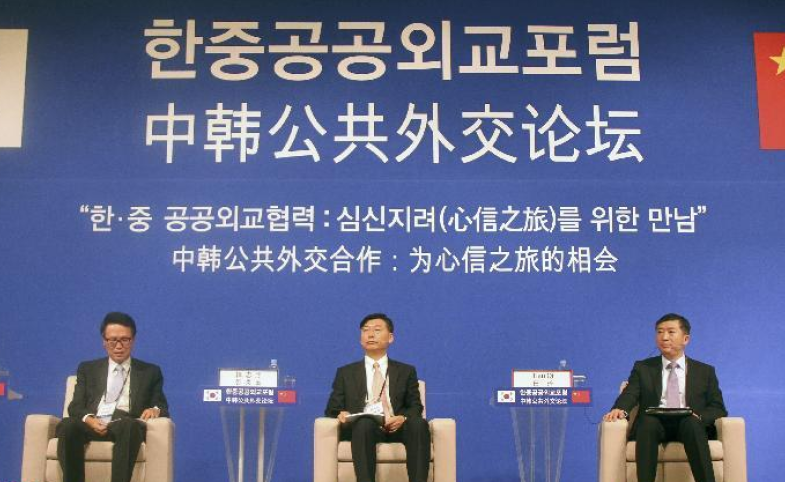In July 2015, Dr. Nancy Snow was named Professor Emeritus of Communications at Cal State Fullerton after an early retirement as Full Professor. This was her highest honor to date, but then in September 2015, she...
KEEP READINGThe CPD Blog is intended to stimulate dialog among scholars and practitioners from around the world in the public diplomacy sphere. The opinions represented here are the authors' own and do not necessarily reflect CPD's views. For blogger guidelines, click here.

Korea Is Redefining Its Role in Public Diplomacy
SEOUL --- At a conference here sponsored by the Korea Foundation, several dozen scholars and practitioners grappled with questions related to Korea’s global and regional diplomatic posture. My own suggestions as a conference participant centered on two questions
• How does public diplomacy relate to the strategic interests of Korea as a leader in East Asia and more specifically as a counterweight to Chinese influence?
• In what ways might new media be used to enhance Korea’s development of innovative public diplomacy programs?
Numerous governments and citizens throughout the world would like to see an effective counterbalance to China in East Asia. Korea, with its commitment to democracy, sophisticated economy, and long-established ties to the United States and other Western countries, is in a strong position to play this role, if it chooses to do so.
Korea is already recognized as a leading exponent of soft power; its traditional culture and exportable technologies are widely recognized and admired, and even its “culinary diplomacy” is much appreciated in many places. The lifestyle of the Korean public is also respected, with benefits of new technologies and personal freedom providing the foundation on which prosperity is built.
In considering these attributes, which happen to be the ones that underscore the differences between Korea and China, I recommend emphasizing those that will have the most appeal to targeted audiences and will do the most to advance the national interests of the Republic of Korea.
This point about national interests is important. I advocate a harder-edged public diplomacy in which being “liked “is secondary to reaching goals grounded in global and regional realpolitik.
Some countries – the United States among them – have found alluring the concept of “soft power” and its emphasis on a state being “attractive” to foreign publics. But attraction is often transient and does little to secure broad and lasting support from those foreign publics. As a cornerstone of a state’s public diplomacy, being admired for being resolute and standing for something will likely be more valuable than the mere gestures that too often pass for substantive policy.
Particularly when facing China, which is committed to using public diplomacy as part of its larger foreign policy, this realism is essential. China finds its own efforts to rely on soft power and employ public diplomacy weakened by widespread suspicion of its motives. This suspicion is strengthened by the recognition that the Chinese public is denied certain basic freedoms.
China might argue that such suspicion is misplaced, and make the case that its citizens have benefitted greatly from the country’s economic advances. Also, China can claim to have restored balance to the global power structure, limiting the hegemonic inclinations of the United States. China nurtures the concept of an “Asian century,” which has appeal within the region. These factors, the Chinese might contend, give validity to China as the principal Asian exponent of soft power.
Nonetheless, an opportunity exists for another East Asian state to assume a role that encompasses regional leadership and global presence. Korea must decide what it wants: does it want to follow China’s lead in the new alignment of power in Asia, or does it want to assert itself as a competitor – note: not an adversary – of China?
If the latter, Korea should do more to establish itself in this position, in part by designing some of its public diplomacy programs to explicitly emphasize its leadership capabilities and contrast its attributes with those of China.
Part of this positioning would be accomplished by carefully planned use of social media. In this field, Korea has a great advantage over China and other countries with restrictive governments: social media use, including choice of venues, is intrinsically linked to the kinds of freedom that the Korean people enjoy and the Chinese public does not.
Korea already has considerable amounts of highly visible product on YouTube and other new media venues, but quantity means little unless there is a strategy behind it. To begin, Korea might contrast its openness with the restrictive regimes elsewhere in East Asia.
For example, a “KOREA=FREEDOM” rubric could help further shape global publics’ perceptions of Korea, its people, its politics, and its place in the world. Cultural freedom, as exemplified by Hallyu (Korean wave music), political freedom, and individual citizens’ participation in the social media campaign would be emphasized. Freedom is a public diplomacy tool that is underused and could be employed more explicitly.
These are just starting points for consideration. All these matters must be refined through careful planning. Most important: Korea must decide if it wants to avail itself of its opportunities to become even more of a regional and global leader in public diplomacy.
Visit CPD's Online Library
Explore CPD's vast online database featuring the latest books, articles, speeches and information on international organizations dedicated to public diplomacy.
POPULAR ARTICLES
-
January 29
-
January 20
-
January 28
-
January 2
-
January 8
Join the Conversation
Interested in contributing to the CPD Blog? We welcome your posts. Read our guidelines and find out how you can submit blogs and photo essays >.













